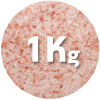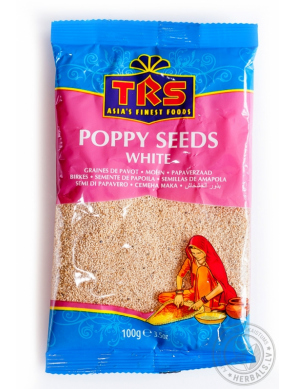Products
- Ayurvedic tea
- Indian teas
- Supplements
- Oils and drinks for health
- Facial Care
- For Skin
- Dental care
- For personal hygiene
- Sport and Yoga
- For Hair Health
- For massage
- Healthcare
- For Women
- Supplements for Men
- Aromatherapy Essential Oil
- Incense sticks
- Indian Food
- Vegan
- Superfoods
- For meditation
- For home
- New Products
- Specials
- Ayurvedic Herbs
- Wholesale
- Gifts and Kits
Browser notifications:
POPPY SEEDS TRS
White poppy seeds
POPPY SEEDS (KHUS KHUS)
TRS, England
Packaging: 100g
Unlike other varieties, the top of the white poppy box remains closed, so this flower is classified as a so-called closed poppy variety. Due to the lack of pigments in the seed coat, the seeds usually have a whitish tint, giving the white poppy its name. The cream-colored poppy seed is more common in India, where it is grown and used as a thickener in curries and sauces. In addition, poppy seeds are added to some types of Indian bread.
The benefits of poppy lie in the microelements, vitamins and minerals it contains, which have a beneficial effect on the human body. Calcium compounds, which provide the beneficial properties of poppy seeds, are contained in an easily digestible form, which is also a positive side. Infusions are made from poppy seeds, which are often taken for nervous disorders; they provide a person with peace of mind during sleep. The benefits of poppy are manifested when making a decoction from it, which helps relieve fatigue, soothes pain and helps with convulsive cough.
The beneficial properties of poppy are also manifested in its anthelmintic effect on the human body. Poppy was often used to treat diarrhea as well as dysentery. Poppy seeds can be ground, in this form they are used in cosmetology, from them they make the so-called milk of poppy, which is very effective if you want to reduce circles under the eyes and relieve inflammation of the eyelids. Poppy milk, which is obtained from seeds, is today an excellent source of protein for vegetarians.
TRS, England
Packaging: 100g
Unlike other varieties, the top of the white poppy box remains closed, so this flower is classified as a so-called closed poppy variety. Due to the lack of pigments in the seed coat, the seeds usually have a whitish tint, giving the white poppy its name. The cream-colored poppy seed is more common in India, where it is grown and used as a thickener in curries and sauces. In addition, poppy seeds are added to some types of Indian bread.
The benefits of poppy lie in the microelements, vitamins and minerals it contains, which have a beneficial effect on the human body. Calcium compounds, which provide the beneficial properties of poppy seeds, are contained in an easily digestible form, which is also a positive side. Infusions are made from poppy seeds, which are often taken for nervous disorders; they provide a person with peace of mind during sleep. The benefits of poppy are manifested when making a decoction from it, which helps relieve fatigue, soothes pain and helps with convulsive cough.
The beneficial properties of poppy are also manifested in its anthelmintic effect on the human body. Poppy was often used to treat diarrhea as well as dysentery. Poppy seeds can be ground, in this form they are used in cosmetology, from them they make the so-called milk of poppy, which is very effective if you want to reduce circles under the eyes and relieve inflammation of the eyelids. Poppy milk, which is obtained from seeds, is today an excellent source of protein for vegetarians.
Also bought
 HIMALAYAN SALT coarse 1kg
2.50€
Himalayan pink salt (coarse)
HIMALAYAN SALT coarse 1kg
2.50€
Himalayan pink salt (coarse)
 HING powder 100g
6.90€
Asafoetida + Fenugreek
HING powder 100g
6.90€
Asafoetida + Fenugreek
 CINNAMON POWDER HERBALS 100g
2.50€
Cinnamon for health and slim body
CINNAMON POWDER HERBALS 100g
2.50€
Cinnamon for health and slim body
Top sellers
 CHIA seeds 500g
5.50€
Chia seeds - a natural source of Omega 3
CHIA seeds 500g
5.50€
Chia seeds - a natural source of Omega 3
 CINNAMON POWDER HERBALS 100g
2.50€
Cinnamon for health and slim body
CINNAMON POWDER HERBALS 100g
2.50€
Cinnamon for health and slim body
 BLACK HIMALAYAN SALT Kala Namak 200g
1.70€
Black volcanic salt Kala Namak, fine
BLACK HIMALAYAN SALT Kala Namak 200g
1.70€
Black volcanic salt Kala Namak, fine
This item has been added to cart.











